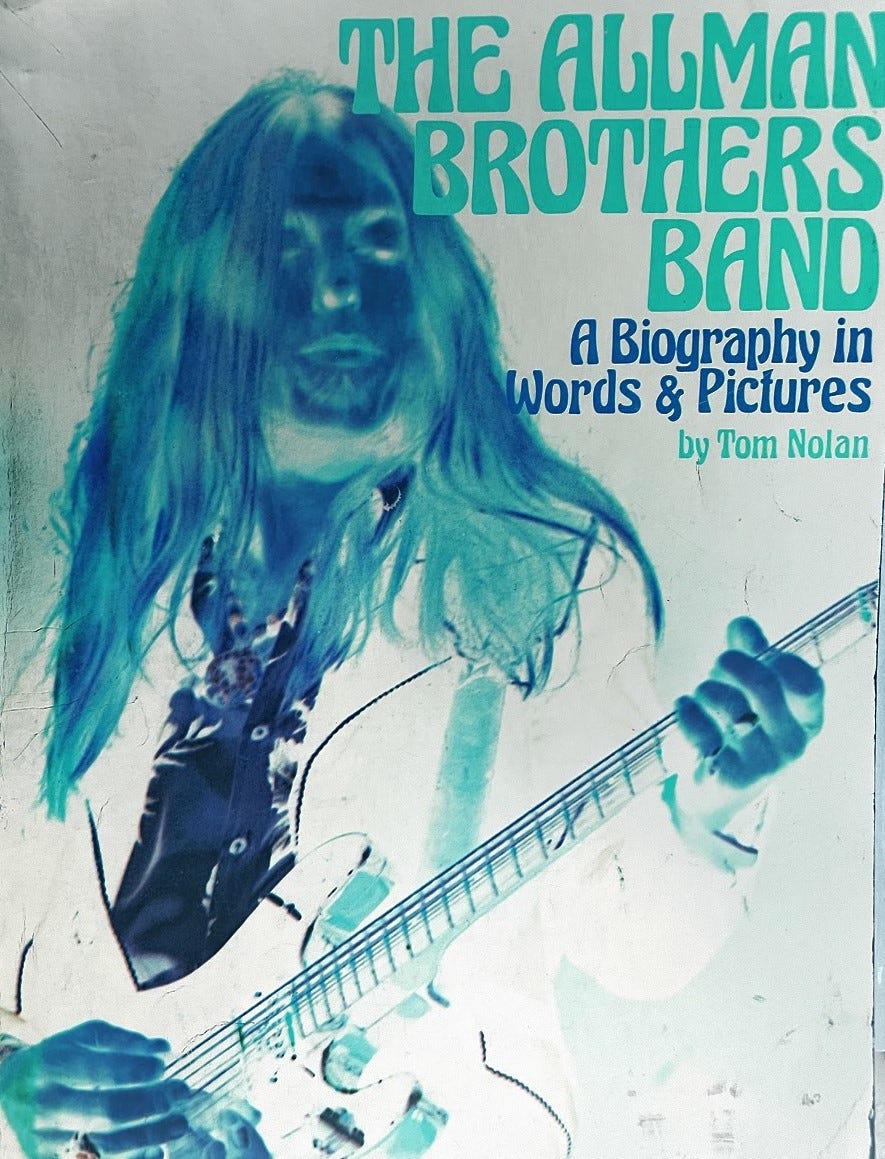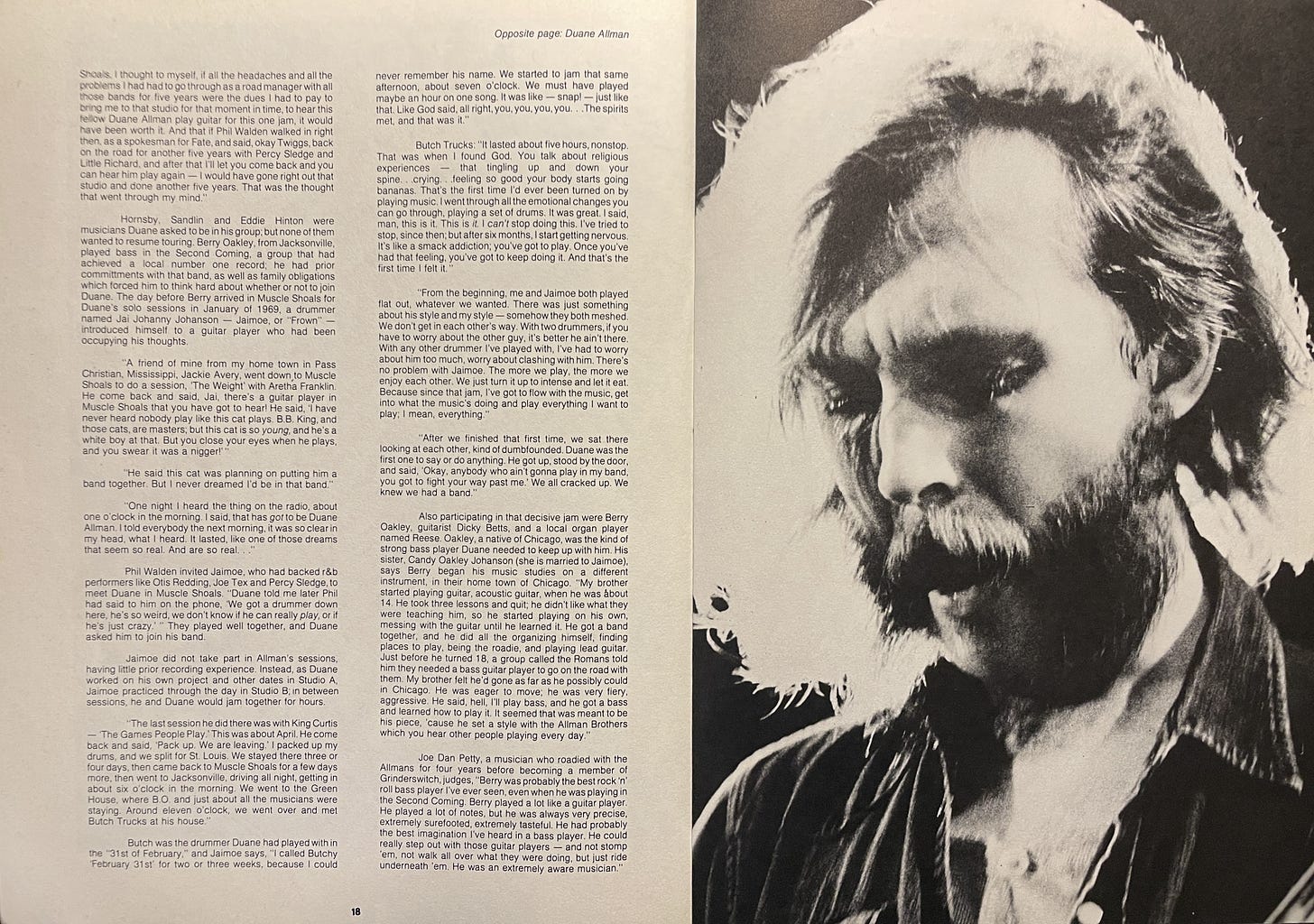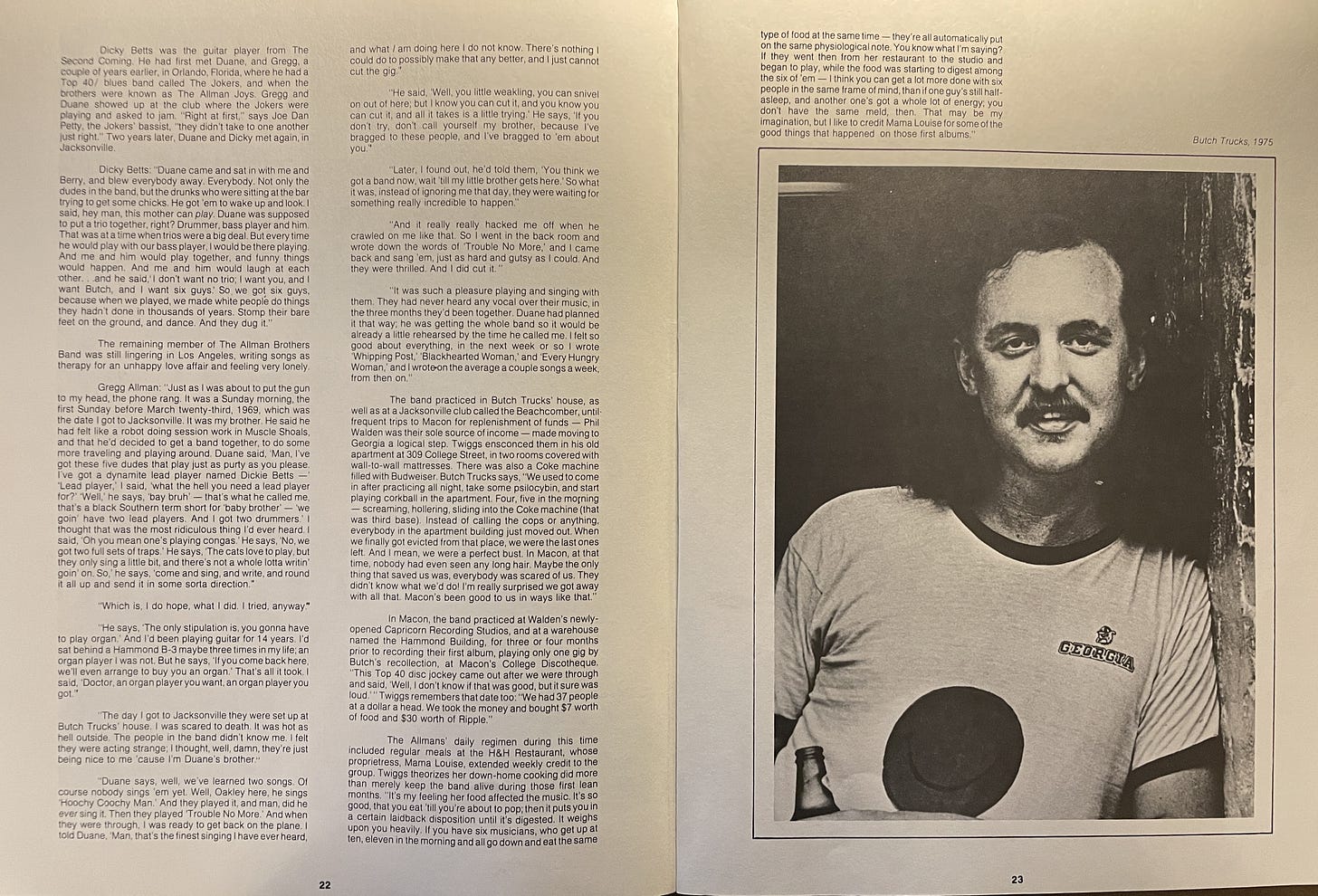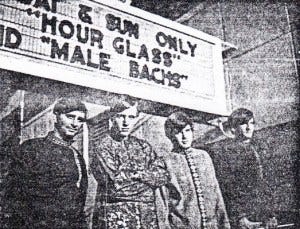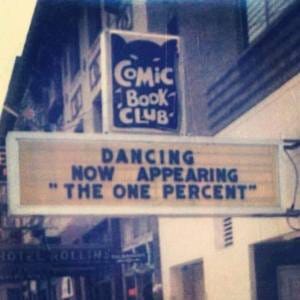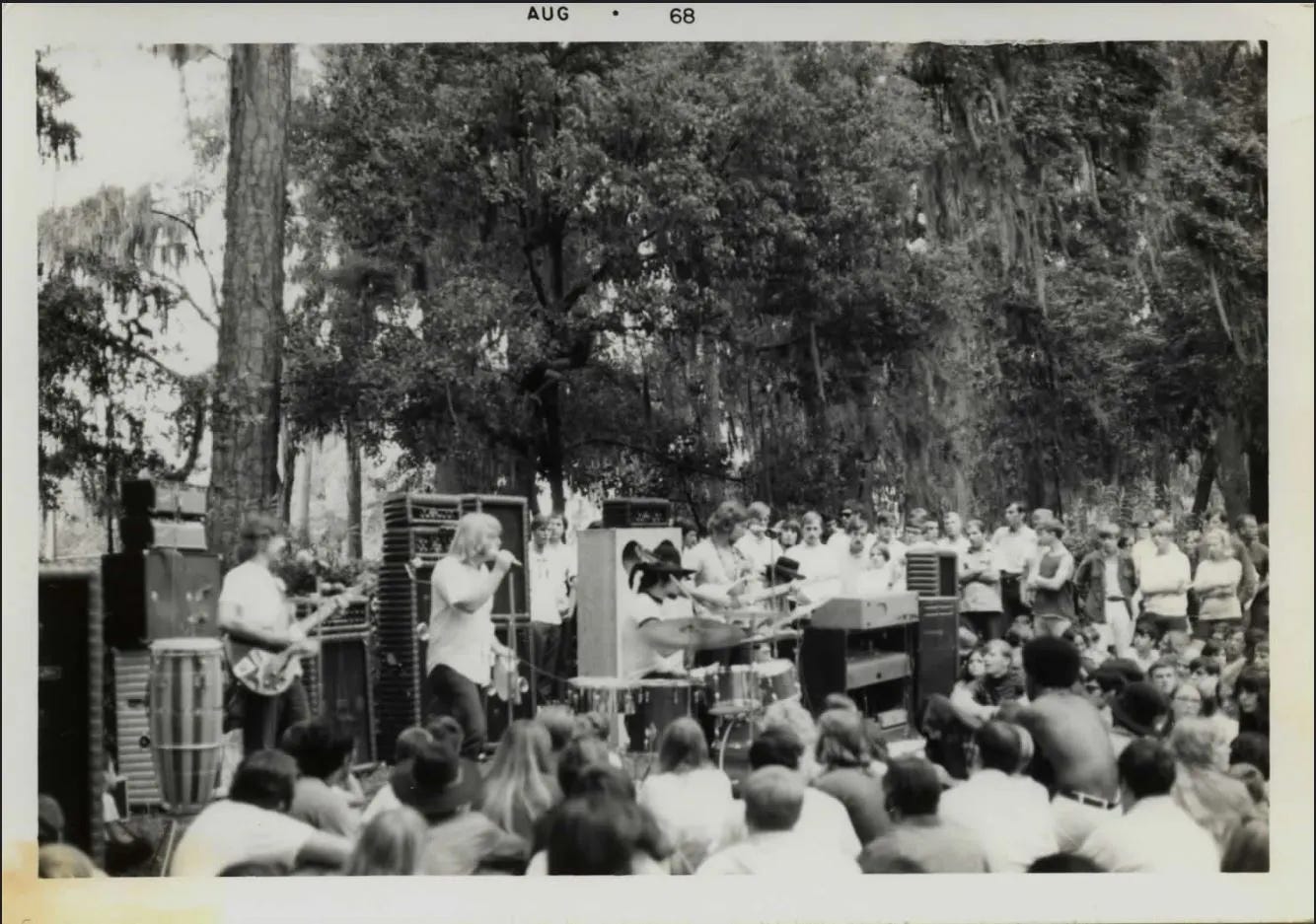I don’t want no trio; I want six guys!
Berry and Dickey sign on with Duane
Welcome back to Long Live the ABB.
Part 5 of my annotated read of the Allman Brothers Band: A Biography is brought to you by paid subscribers of the blog. Thanks, y’all, for helping me do what I do around here.
Here’s the rest of the series.
These are the pages I’m commenting on today1
Dr. B’s Marginalia
The original text looks like this.
My comments look like this.
Previously on Long Live the ABB
The Jacksonville Jam
I never tire of the various retellings of the story of the Jacksonville Jam. Here’s Butch in 1975.
“After we finished that first time, we sat there looking at each other, kind of dumbfounded. Duane was the first one to say or do anything. He got up, stood by the door, and said, ‘Okay, anybody who ain’t gonna play in my band, you got to fight your way past me.’ We all cracked up. We knew we had a band.”
I basically left off right where the book introduces Dickey Betts.
Also participating in that decisive jam were Berry Oakley, guitarist Dickey Betts, and a local organ player named Reese.
Reese Wynans was the Second Coming’s keyboard player. He went on to play with Stevie Ray Vaughn and currently tours with Joe Bonamassa. More significant to this story was that he played B-3 with the Brothers at Madison Square Garden March 10, 2020.2 (A little of that #mushroommagic at work.)
Enter Berry Oakley
Oakley, a native of Chicago, was the kind of strong bass player Duane needed to keep up with him. His sister, Candy Oakley Johanson (she is married to Jaimoe), says Berry began his music studies on a different instrument, in their home town of Chicago.
“My brother started playing guitar, acoustic guitar, when he was about 14. He took three lessons and quit; he didn’t like what they were teaching him, so he started playing on his own, messing with the guitar until he learned it. He got a band together, and he did all the organizing himself, finding places to play, being the roadie, and playing lead guitar.
Just before he turned 18, a group called the Romans3 told him they needed a bass guitar player to go on the road with them. My brother felt he’d gone as far as he possibly could in Chicago.
He was eager to move; he was very fiery, aggressive. He said, hell, I’ll play bass, and he got a bass and learned how to play it. It seemed that was meant to be his piece, ‘cause he set a style with the Allman Brothers which you hear other people playing every day.”
Leading bands at 14 and playing guitar on Rush Street, the center of Chicago nightlife, by 17. “It was the beginning of his senior year in high school,” his sister Candace said, “and he was playing in the city at night and getting home at the crack of dawn.”
In fall 1965, Oakley got his break when singer Tommy Roe’s bass player was drafted. Though Berry didn’t play the instrument, he volunteered for the gig. He was eager to move on from Chicago.
He dropped out of high school and moved to Atlanta, Roe’s home base. From that moment forward, the Chicago native was officially a southerner. “I’ve been down South ever since and I really dig it,” he said.
Joe Dan Petty, a musician who roadied with the Allmans for four years before becoming a member of Grinderswitch, judges,
“Berry was probably the best rock’n’roll bass player I’ve ever seen, even when he was playing in the Second Coming. Berry played a lot like a guitar player.
(here’s yours truly riffing on this very quote)
He played a lot of notes, but he was always very precise. extremely surefooted, extremely tasteful. He had probably the best imagination I’ve heard in a bass player. He could really step out with those guitar players - and not stomp ‘em, not walk all over what they were doing, but just ride underneath ‘em. He was an extremely aware musician.”
His skill and experience on lead guitar made him an especially intuitive bass player, particularly in complement to the guitars. The bass, which Oakley played with a thumb pick, remained his primary instrument for the rest of his life.
Berry and Duane met in July 1968 at an Hour Glass gig at the Comic Book club4 in in Jacksonville. The meeting sparked an intense, fruitful musical partnership. They bonded immediately over their shared musical influences and vision.
“You have got to come to the park and see my band play,” Berry told Duane. “You will not believe the crowds. All those kids were just hungry for some decent music, and we are giving it to them. They show up by the hundreds and we just play whatever we feel.”
By 1967 Oakley had migrated to southwest Florida and joined the Bittersweet where he met guitarist Dickey Betts. Betts and Oakley formed an immediate bond, musically and otherwise. As the only dudes in town with long hair, said Dickey, “People would throw shit at us.”
Dickey Betts was the guitar player from the Second Coming.
He had first met Duane, and Gregg, a couple of years earlier, in Orlando, Florida, where he had a Top 40/ blues band called the Jokers5, and when the brothers were known as the Allman Joys. Gregg and Duane showed up at the club where the Jokers were playing and asked to jam. “Right at first,” says Joe Dan Petty, the Jokers’ bassist, “they didn’t take to one another just right.”
As Dickey said, “I respected Duane a lot from the very first because of his guitar playing, but he was a bit standoffish.” As Duane plugged into Dickey’s amp, Dickey tried to orient him to it. “I know how to work an amp,” Duane snapped.
Two years later, Duane and Dickey met again, in Jacksonville.
Dickey Betts, “Duane came and sat in with me and Berry, and blew everybody away. Everybody. Not only the dudes in the band, but the drunks who were sitting at the bar trying to get some chicks. He got ‘em to wake up and look. I said, hey man, this mother can play.
Duane was supposed to put a trio together, right? Drummer, bass player, and him.
That was at a time when trios were a big deal. But every time he would play with our bass player, I would be there playing.
And me and him would play together, and funny things would happen. And me and him would laugh at each other.
And he said, “I don’t want no trio; I want you, and I want Butch, and I want six guys!”
So we got six guys, because when we played, we made white people do things they hadn’t done in thousands of years. Stomp their bare feet on the ground, and dance. And they dug it.”
I ABBsolutely LOVE Dickey’s tongue-in-cheek description about the undeniable GROOVE of the Allman Brothers Band.
The remaining member of the Allman Brothers Band was still lingering in Los Angeles, writing songs as therapy for an unhappy love affair and feeling very lonely.
It’s a quirk of history that the last person to officially join the Allman Brothers Band in March 1969 was Gregg.
The brothers had been estranged since the previous September, when Gregg fled Florida for California to fulfill Hour Glass’s contract.
Up Next
This story, right here:
Thanks for reading.
It’s great to have you here.
Full text of book: Tom Nolan: The Allman Brothers Band.
The last BIG rock gathering in the Beforetimes.
They were the Roemans—the “e” a play on Roe’s name. Here’s video of Berry with the band. That’s Bertie Higgins of the 80s hit “Key Largo” on drums/vocals
The Comic Book Club was a non-alcoholic venue at 2359 Peachtree Road in Jacksonville. Check out Larry Steele’s website for more info.
Rick Derringer immortalized Dickey/the Jokers in “Rock & Roll Hoochie Coo”—there was a group called the Jokers, they were layin’ it down.



